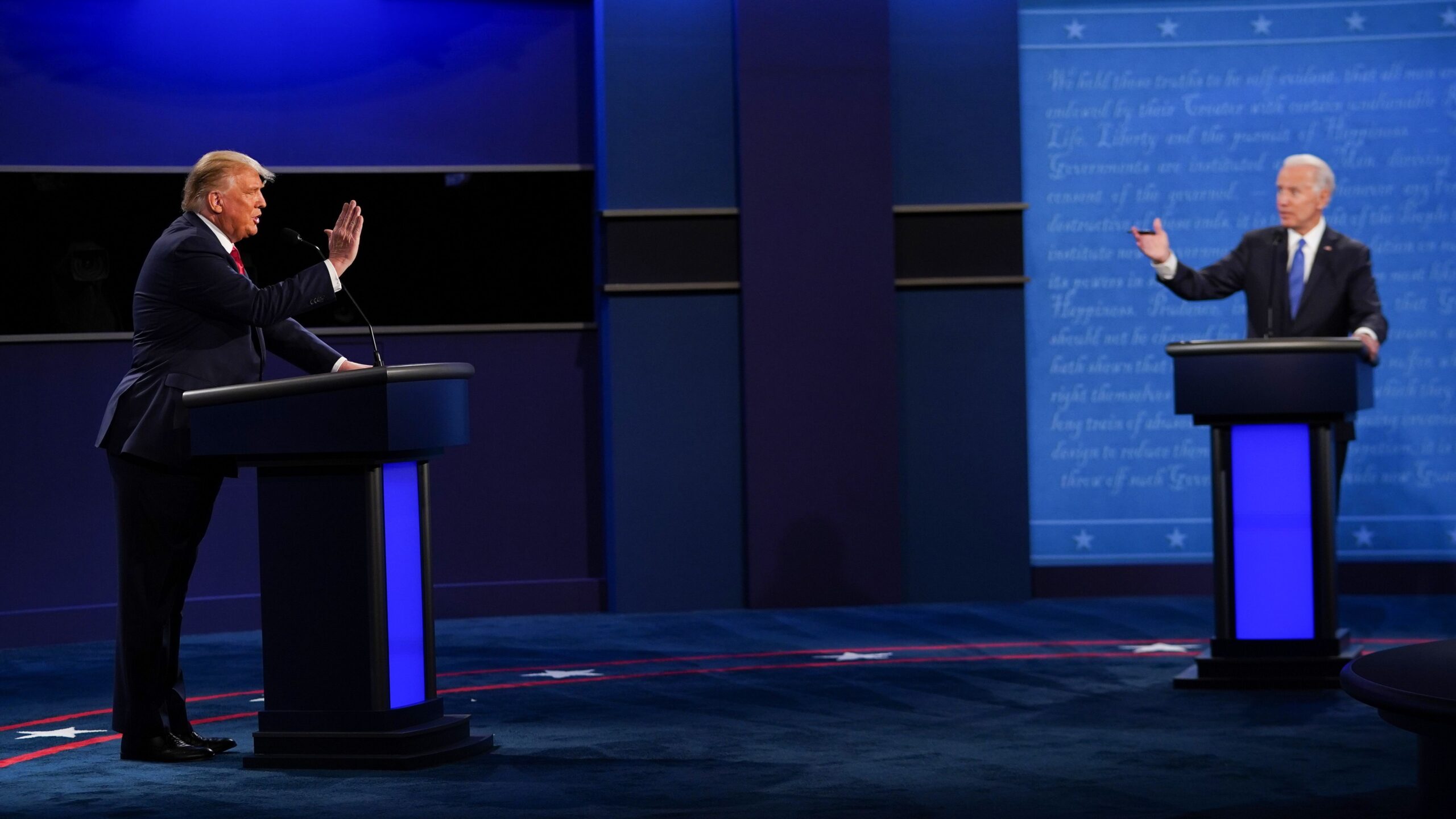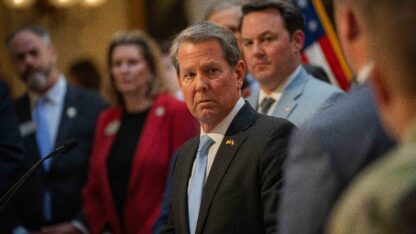President Trump and former Vice President Joe Biden met for their second and final debate as tens of millions of Americans have already voted. A deeply divided country begins its final sprint to Election Day amid the coronavirus pandemic, and it’s unclear how many voters have yet to make up their minds.
Here are five takeaways from the debate in Nashville, Tenn., a much different — and far more civil — night than the last encounter.
1. There was a real debate
The first debate between Trump and Biden was unwatchable. It was overwhelmed by interruptions and cross-talk, disregard for the moderator and name-calling — all largely on the part of the president.
New rules imposed by the Commission on Presidential Debates included a mute button operated by a staffer for the CPD that turned off each candidate’s microphone for the first 2 minutes of his opponent’s speaking time at the beginning of each debate topic.
Moderator Kristen Welker of NBC News skillfully kept the conversation moving. She followed up and pressed for answers and fairly gave both candidates opportunities to respond to the other’s comments. Welker pushed back when the candidates attempted to run over time or tried to change the subject. She was firm and her no-nonsense approach held the candidates to task.
Trump dropped in the polls after the first debate and got advice from Republicans to tone it down this time. Last night he was more measured and attempted to stay on message. Biden was also more disciplined and came prepared to address personal attacks the Trump campaign signaled beforehand it was going to make about his son Hunter’s business dealings.
2. The coronavirus is still the driving force in the election
The 2020 election remains focused on Trump’s handling of the coronavirus, and it was the subject of Welker’s first question. Both candidates tested negative for the coronavirus prior to entering the venue on Thursday, and those in the small audience were required to wear masks. Members of the Trump family adhered to the rules, donning masks and appearing to keep them on after conspicuously refusing to do so during the first debate.
The two candidates’ approaches and attitudes could not have been more different on the pandemic. Biden warned a “dark winter” was looming and that with 220,000 Americans dead the president had failed from the outset to take control of the response to the virus.
“Anyone who is responsible for that many deaths should not remain as president of the United States of the America,” Biden said.
Trump repeatedly claimed that his approach saved millions of lives and that “we’re rounding the turn.” After testing positive himself following the last debate, the president acknowledged he had personal experience with the disease but argued it was manageable, saying, “I had it. And I got better.”
He repeated his claim that a vaccine was weeks away, but when pressed admitted: “It’s not a guarantee.” Trump said “it has a good chance by the end of the year” to be approved, and that he had a plan lined up for the military to help distribute millions of doses.
The president attempted to pivot to the economic impact of returning to restrictions, arguing that Biden wanted to shut down the country, saying: “We can’t keep this country closed. This is a massive country with a massive economy. People are losing their jobs.”
Biden retorted, referring to the virus, “He says that we’re learning to live with it. People are learning to die with it.”
3. Health care debate pitted “Bidencare” versus ending Obamacare
Democrats have made the GOP effort to end Obamacare a key line of attack in the campaign, both in the presidential election and in congressional races, and it’s proven effective.
Biden dubbed his plan for the Affordable Care Act “Bidencare” during Thursday night’s debate.
The president vowed to protect preexisting conditions, but Biden hammered him for not presenting a plan to replace the ACA despite four years of indicating one was imminent. The Supreme Court is slated to hear a challenge to the law brought by the Trump administration one week after the election. As he’s done before, Biden linked health care concerns over the coronavirus pandemic to the administration’s efforts to dismantle the ACA.
Earlier on Thursday, the president released raw video from a taped interview with the CBS News program 60 Minutes where he was pressed about his position on the ACA. Trump declared, “I hope that they end it. It’ll be so good if they end it.” And during the debate he continued to sharply criticize the ACA, which 10 years after it was implemented is more popular and has proven to be a political plus for Democrats.
“What we’d like to do is terminate it,” the president said, also noting that he “terminated” the individual mandate that required people to enroll in coverage plans or pay a fine.
The president maintained Biden’s plan amounted to socialized medicine that would threaten Medicare, the popular government health coverage for seniors. He equated Biden’s plan with that of other Democrats who during the primary pushed for a more sweeping “Medicare for All” program.
But Biden disavowed those proposals, saying, “I beat all those other people because I disagreed with them” on health care.
4. Trump attacked Biden as a typical politician, engaged in corruption
Trump won in 2016 in part by arguing he wasn’t a politician, that he was a businessman who was going to Washington to “drain the swamp.” He has been trying in the past couple of weeks to reprise that strategy, and to paint Biden as a corrupt Washington figure who has a 47-year career in government without much to show for it. Even though reelection races for incumbents are usually referendums on their first terms, Trump has talked less about his own record and more about Biden’s.
Going into the debate, the Trump campaign signaled the president would home in on Biden’s son Hunter’s work with overseas businesses, arguing it led to the former vice president personally enriching himself. The president pointed to reports in the New York Post about alleged emails from Hunter that described efforts to create a business venture in China that included money for his father and his uncle.
But the authenticity of the material cited in the news reports has not been verified — it was given to the Post by Trump’s attorney and ally, Rudy Giuliani. And Biden’s campaign denies the allegations. One of the Trump campaign’s guests at the debate was a man who claims to be a former business associate of Hunter Biden who said he had direct knowledge that Joe Biden was involved in his son’s business dealings and was planning to meet with Senate GOP investigators about the matter.
Biden was ready for the attack. “I have not taken a penny from any foreign source ever in my life,” he said. He argued that Trump’s focus on the Biden family was intended to distract from the problems facing voters’ families.
The president waved off Biden’s answers as changing the subject like other “typical politicians,” saying, “I’m not a typical politician. That’s why I got elected.”
The president made multiple references to Biden receiving millions from foreign governments, but didn’t provide any evidence to support his claims. Biden pointed out that many of Trump’s allegations about the Biden family were proven false during the impeachment probe.
With less than two weeks before Election Day, Trump’s effort to change the focus of the campaign may not connect and could have been confusing to voters because his charges were less than clear. Also many voters are focused on the economy and health care, not on unsupported allegations of corruption.
Biden did use the exchange to bring up a New York Times report that revealed Trump himself had a Chinese bank account, which raised questions about Trump’s own tax payments to China and refusal to release his U.S. tax returns. The president said he believe he closed the China account and claimed again he will release his returns once an IRS audit is completed. The IRS is on record that the audit does not prevent Trump from releasing his returns now.
5. The debate may not matter
More than 40 million people have already voted, and recent polls show a very small sliver of the electorate is persuadable this close to the election. Even Biden appeared bored, and near the end of the debate checked his watch.
Both campaigns chiefly wanted to avoid any major mistakes in the last debate, and both candidates delivered. Now their focus in the final stretch will be to get out supporters and see how states process an unprecedented number of ballots from those voting early or by mail to avoid lengthy lines during a continuing national health crisis.
Copyright 2020 NPR. To see more, visit https://www.npr.org.
9(MDAxODM0MDY4MDEyMTY4NDA3MzI3YjkzMw004))

9(MDAxODM0MDY4MDEyMTY4NDA3MzI3YjkzMw004))








